Organisational Development of Uber: A Comprehensive Analysis
VerifiedAdded on 2021/04/21
|8
|1418
|91
Report
AI Summary
This report provides a comprehensive analysis of the organizational development of Uber, examining the company through the lens of Brown's Five Stage Model. It identifies the need for change within Uber's corporate culture, highlighting issues such as employee dissatisfaction and the need for improved organizational practices to enhance profitability and employee retention. The report explores the importance of ethical considerations in organizational development, emphasizing the need for transparent communication and the application of humanistic values. It also discusses the strengths and weaknesses of secondary research methods used in the analysis, as well as the limitations of the OD consultancy approach. The report concludes by suggesting that Uber needs to embrace updated work practices and innovative approaches to foster an improved organizational culture, ultimately leading to enhanced employee performance and satisfaction. The report uses secondary research methods to analyze Uber's organizational structure, challenges, and potential strategies for improvement.
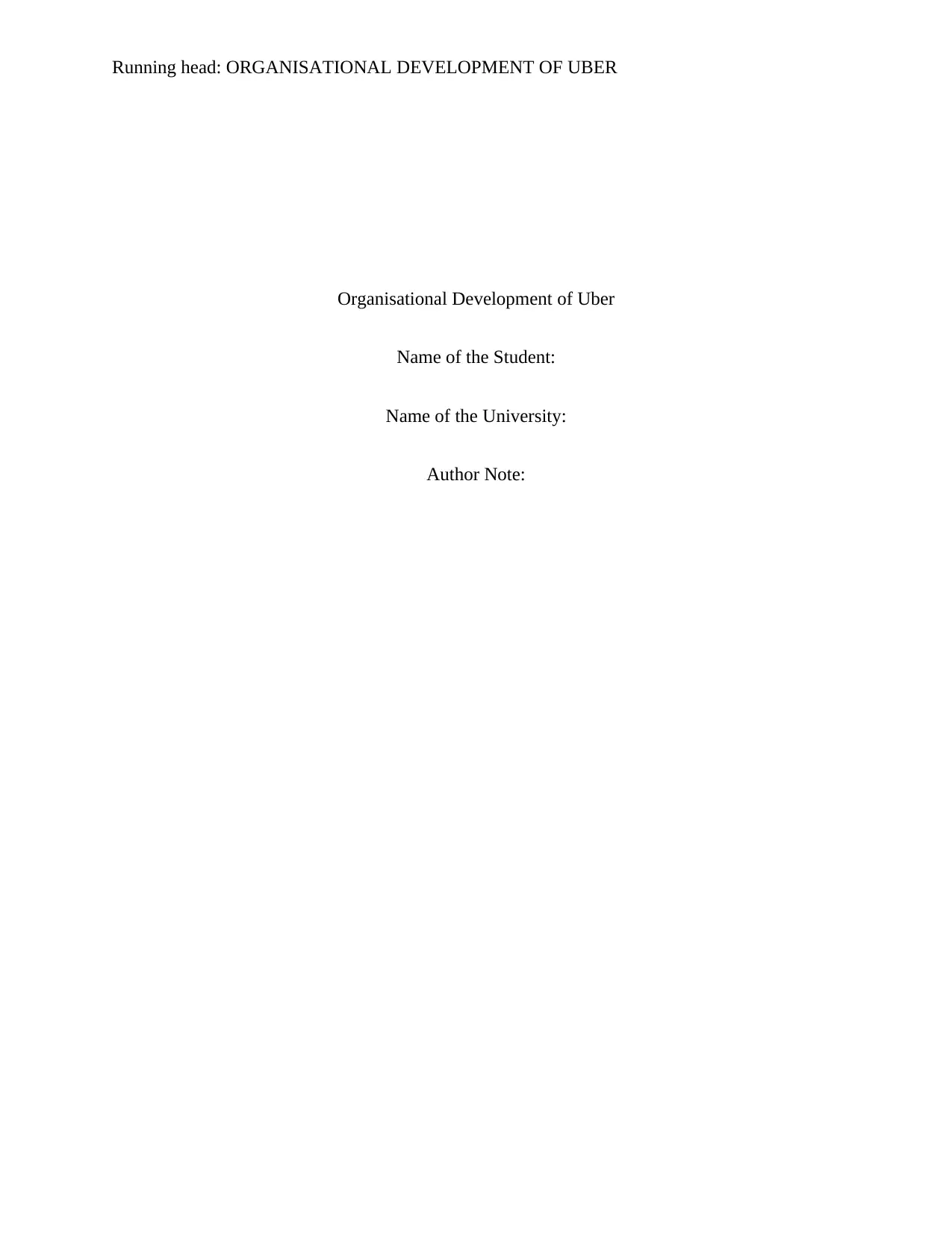
Running head: ORGANISATIONAL DEVELOPMENT OF UBER
Organisational Development of Uber
Name of the Student:
Name of the University:
Author Note:
Organisational Development of Uber
Name of the Student:
Name of the University:
Author Note:
Paraphrase This Document
Need a fresh take? Get an instant paraphrase of this document with our AI Paraphraser

1
ORGANISATIONAL DEVELOPMENT OF UBER
Table of Contents
1. Humanistic Values Organisational Development and Brown’s Five Stage Model.....................2
2. Brief Discussion of the OD Ethics...............................................................................................4
3. Discussion of the Strengths and Weaknesses of the Secondary Research methods used in terms
of Reliability and Validity...............................................................................................................5
4. Critical Discussion of Limitations of OD Consultancy Approach..............................................6
References........................................................................................................................................7
ORGANISATIONAL DEVELOPMENT OF UBER
Table of Contents
1. Humanistic Values Organisational Development and Brown’s Five Stage Model.....................2
2. Brief Discussion of the OD Ethics...............................................................................................4
3. Discussion of the Strengths and Weaknesses of the Secondary Research methods used in terms
of Reliability and Validity...............................................................................................................5
4. Critical Discussion of Limitations of OD Consultancy Approach..............................................6
References........................................................................................................................................7
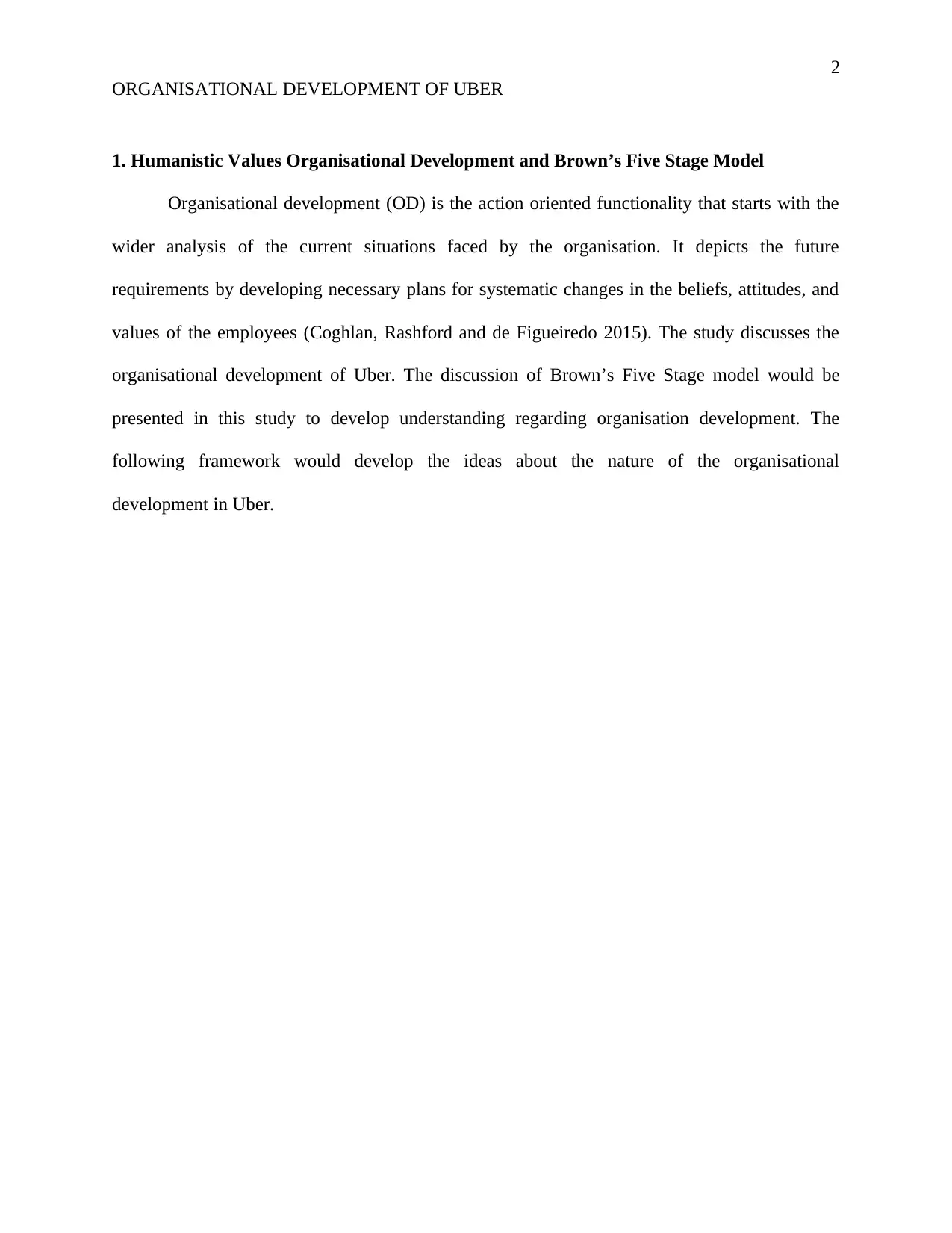
2
ORGANISATIONAL DEVELOPMENT OF UBER
1. Humanistic Values Organisational Development and Brown’s Five Stage Model
Organisational development (OD) is the action oriented functionality that starts with the
wider analysis of the current situations faced by the organisation. It depicts the future
requirements by developing necessary plans for systematic changes in the beliefs, attitudes, and
values of the employees (Coghlan, Rashford and de Figueiredo 2015). The study discusses the
organisational development of Uber. The discussion of Brown’s Five Stage model would be
presented in this study to develop understanding regarding organisation development. The
following framework would develop the ideas about the nature of the organisational
development in Uber.
ORGANISATIONAL DEVELOPMENT OF UBER
1. Humanistic Values Organisational Development and Brown’s Five Stage Model
Organisational development (OD) is the action oriented functionality that starts with the
wider analysis of the current situations faced by the organisation. It depicts the future
requirements by developing necessary plans for systematic changes in the beliefs, attitudes, and
values of the employees (Coghlan, Rashford and de Figueiredo 2015). The study discusses the
organisational development of Uber. The discussion of Brown’s Five Stage model would be
presented in this study to develop understanding regarding organisation development. The
following framework would develop the ideas about the nature of the organisational
development in Uber.
⊘ This is a preview!⊘
Do you want full access?
Subscribe today to unlock all pages.

Trusted by 1+ million students worldwide
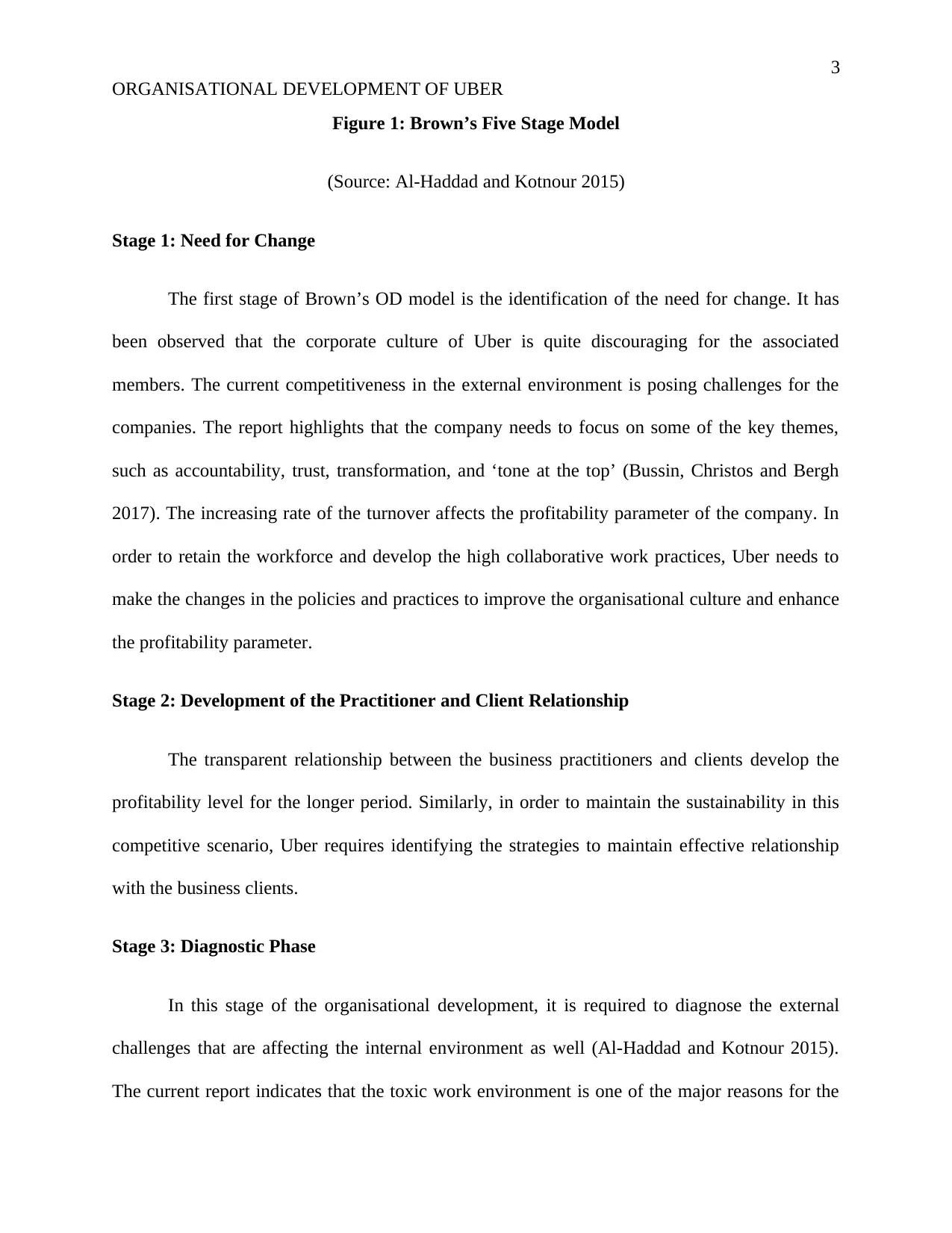
3
ORGANISATIONAL DEVELOPMENT OF UBER
Figure 1: Brown’s Five Stage Model
(Source: Al-Haddad and Kotnour 2015)
Stage 1: Need for Change
The first stage of Brown’s OD model is the identification of the need for change. It has
been observed that the corporate culture of Uber is quite discouraging for the associated
members. The current competitiveness in the external environment is posing challenges for the
companies. The report highlights that the company needs to focus on some of the key themes,
such as accountability, trust, transformation, and ‘tone at the top’ (Bussin, Christos and Bergh
2017). The increasing rate of the turnover affects the profitability parameter of the company. In
order to retain the workforce and develop the high collaborative work practices, Uber needs to
make the changes in the policies and practices to improve the organisational culture and enhance
the profitability parameter.
Stage 2: Development of the Practitioner and Client Relationship
The transparent relationship between the business practitioners and clients develop the
profitability level for the longer period. Similarly, in order to maintain the sustainability in this
competitive scenario, Uber requires identifying the strategies to maintain effective relationship
with the business clients.
Stage 3: Diagnostic Phase
In this stage of the organisational development, it is required to diagnose the external
challenges that are affecting the internal environment as well (Al-Haddad and Kotnour 2015).
The current report indicates that the toxic work environment is one of the major reasons for the
ORGANISATIONAL DEVELOPMENT OF UBER
Figure 1: Brown’s Five Stage Model
(Source: Al-Haddad and Kotnour 2015)
Stage 1: Need for Change
The first stage of Brown’s OD model is the identification of the need for change. It has
been observed that the corporate culture of Uber is quite discouraging for the associated
members. The current competitiveness in the external environment is posing challenges for the
companies. The report highlights that the company needs to focus on some of the key themes,
such as accountability, trust, transformation, and ‘tone at the top’ (Bussin, Christos and Bergh
2017). The increasing rate of the turnover affects the profitability parameter of the company. In
order to retain the workforce and develop the high collaborative work practices, Uber needs to
make the changes in the policies and practices to improve the organisational culture and enhance
the profitability parameter.
Stage 2: Development of the Practitioner and Client Relationship
The transparent relationship between the business practitioners and clients develop the
profitability level for the longer period. Similarly, in order to maintain the sustainability in this
competitive scenario, Uber requires identifying the strategies to maintain effective relationship
with the business clients.
Stage 3: Diagnostic Phase
In this stage of the organisational development, it is required to diagnose the external
challenges that are affecting the internal environment as well (Al-Haddad and Kotnour 2015).
The current report indicates that the toxic work environment is one of the major reasons for the
Paraphrase This Document
Need a fresh take? Get an instant paraphrase of this document with our AI Paraphraser
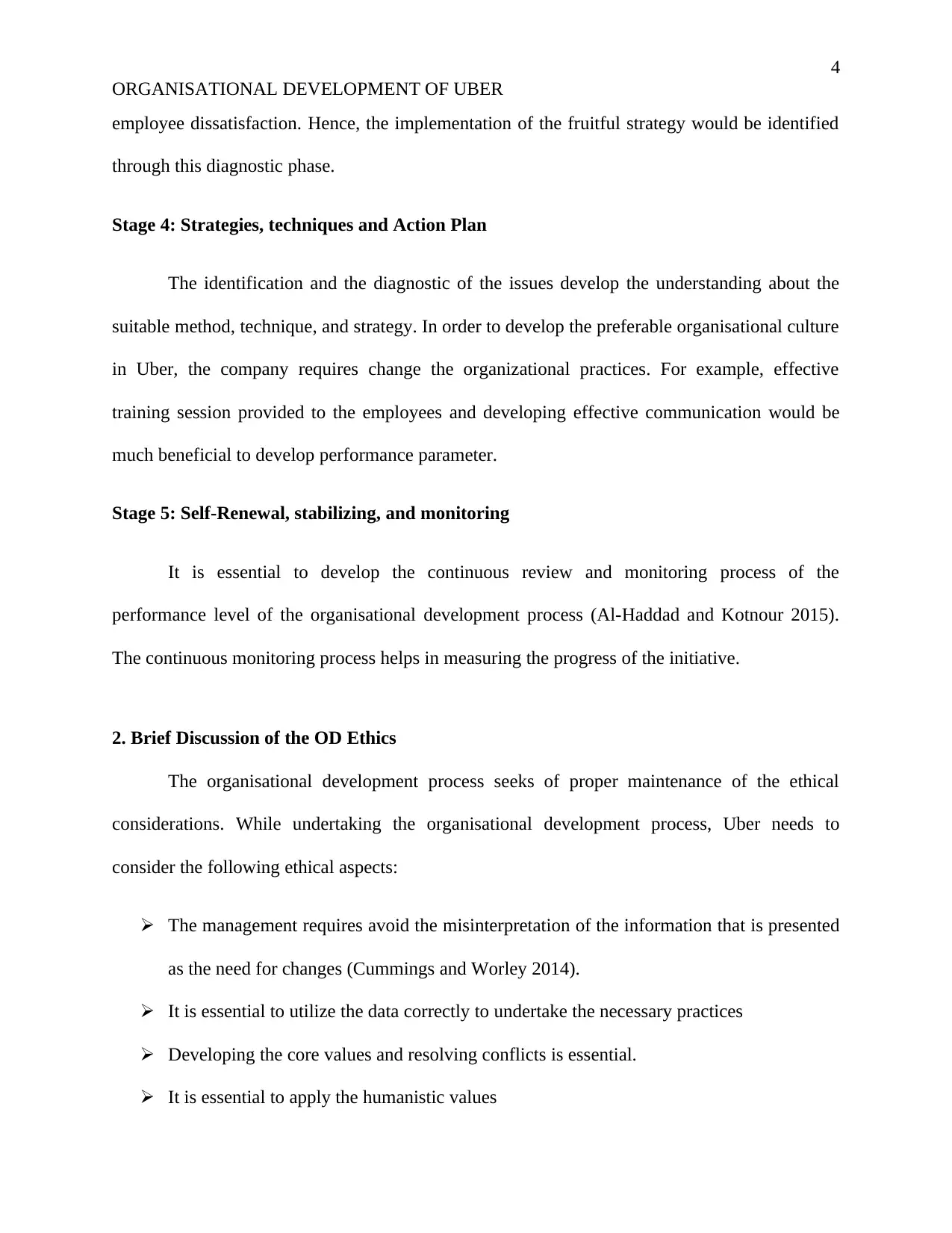
4
ORGANISATIONAL DEVELOPMENT OF UBER
employee dissatisfaction. Hence, the implementation of the fruitful strategy would be identified
through this diagnostic phase.
Stage 4: Strategies, techniques and Action Plan
The identification and the diagnostic of the issues develop the understanding about the
suitable method, technique, and strategy. In order to develop the preferable organisational culture
in Uber, the company requires change the organizational practices. For example, effective
training session provided to the employees and developing effective communication would be
much beneficial to develop performance parameter.
Stage 5: Self-Renewal, stabilizing, and monitoring
It is essential to develop the continuous review and monitoring process of the
performance level of the organisational development process (Al-Haddad and Kotnour 2015).
The continuous monitoring process helps in measuring the progress of the initiative.
2. Brief Discussion of the OD Ethics
The organisational development process seeks of proper maintenance of the ethical
considerations. While undertaking the organisational development process, Uber needs to
consider the following ethical aspects:
The management requires avoid the misinterpretation of the information that is presented
as the need for changes (Cummings and Worley 2014).
It is essential to utilize the data correctly to undertake the necessary practices
Developing the core values and resolving conflicts is essential.
It is essential to apply the humanistic values
ORGANISATIONAL DEVELOPMENT OF UBER
employee dissatisfaction. Hence, the implementation of the fruitful strategy would be identified
through this diagnostic phase.
Stage 4: Strategies, techniques and Action Plan
The identification and the diagnostic of the issues develop the understanding about the
suitable method, technique, and strategy. In order to develop the preferable organisational culture
in Uber, the company requires change the organizational practices. For example, effective
training session provided to the employees and developing effective communication would be
much beneficial to develop performance parameter.
Stage 5: Self-Renewal, stabilizing, and monitoring
It is essential to develop the continuous review and monitoring process of the
performance level of the organisational development process (Al-Haddad and Kotnour 2015).
The continuous monitoring process helps in measuring the progress of the initiative.
2. Brief Discussion of the OD Ethics
The organisational development process seeks of proper maintenance of the ethical
considerations. While undertaking the organisational development process, Uber needs to
consider the following ethical aspects:
The management requires avoid the misinterpretation of the information that is presented
as the need for changes (Cummings and Worley 2014).
It is essential to utilize the data correctly to undertake the necessary practices
Developing the core values and resolving conflicts is essential.
It is essential to apply the humanistic values
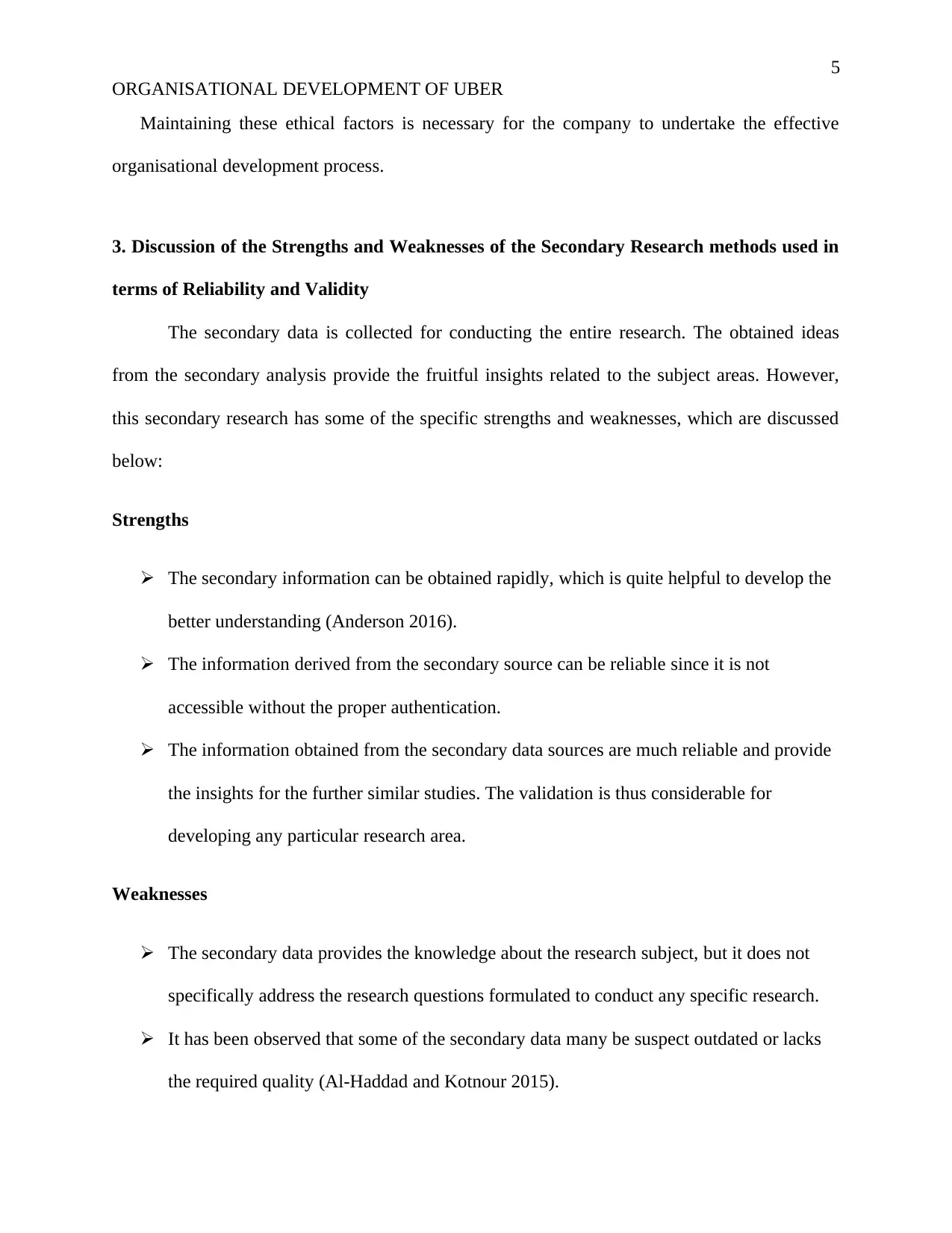
5
ORGANISATIONAL DEVELOPMENT OF UBER
Maintaining these ethical factors is necessary for the company to undertake the effective
organisational development process.
3. Discussion of the Strengths and Weaknesses of the Secondary Research methods used in
terms of Reliability and Validity
The secondary data is collected for conducting the entire research. The obtained ideas
from the secondary analysis provide the fruitful insights related to the subject areas. However,
this secondary research has some of the specific strengths and weaknesses, which are discussed
below:
Strengths
The secondary information can be obtained rapidly, which is quite helpful to develop the
better understanding (Anderson 2016).
The information derived from the secondary source can be reliable since it is not
accessible without the proper authentication.
The information obtained from the secondary data sources are much reliable and provide
the insights for the further similar studies. The validation is thus considerable for
developing any particular research area.
Weaknesses
The secondary data provides the knowledge about the research subject, but it does not
specifically address the research questions formulated to conduct any specific research.
It has been observed that some of the secondary data many be suspect outdated or lacks
the required quality (Al-Haddad and Kotnour 2015).
ORGANISATIONAL DEVELOPMENT OF UBER
Maintaining these ethical factors is necessary for the company to undertake the effective
organisational development process.
3. Discussion of the Strengths and Weaknesses of the Secondary Research methods used in
terms of Reliability and Validity
The secondary data is collected for conducting the entire research. The obtained ideas
from the secondary analysis provide the fruitful insights related to the subject areas. However,
this secondary research has some of the specific strengths and weaknesses, which are discussed
below:
Strengths
The secondary information can be obtained rapidly, which is quite helpful to develop the
better understanding (Anderson 2016).
The information derived from the secondary source can be reliable since it is not
accessible without the proper authentication.
The information obtained from the secondary data sources are much reliable and provide
the insights for the further similar studies. The validation is thus considerable for
developing any particular research area.
Weaknesses
The secondary data provides the knowledge about the research subject, but it does not
specifically address the research questions formulated to conduct any specific research.
It has been observed that some of the secondary data many be suspect outdated or lacks
the required quality (Al-Haddad and Kotnour 2015).
⊘ This is a preview!⊘
Do you want full access?
Subscribe today to unlock all pages.

Trusted by 1+ million students worldwide
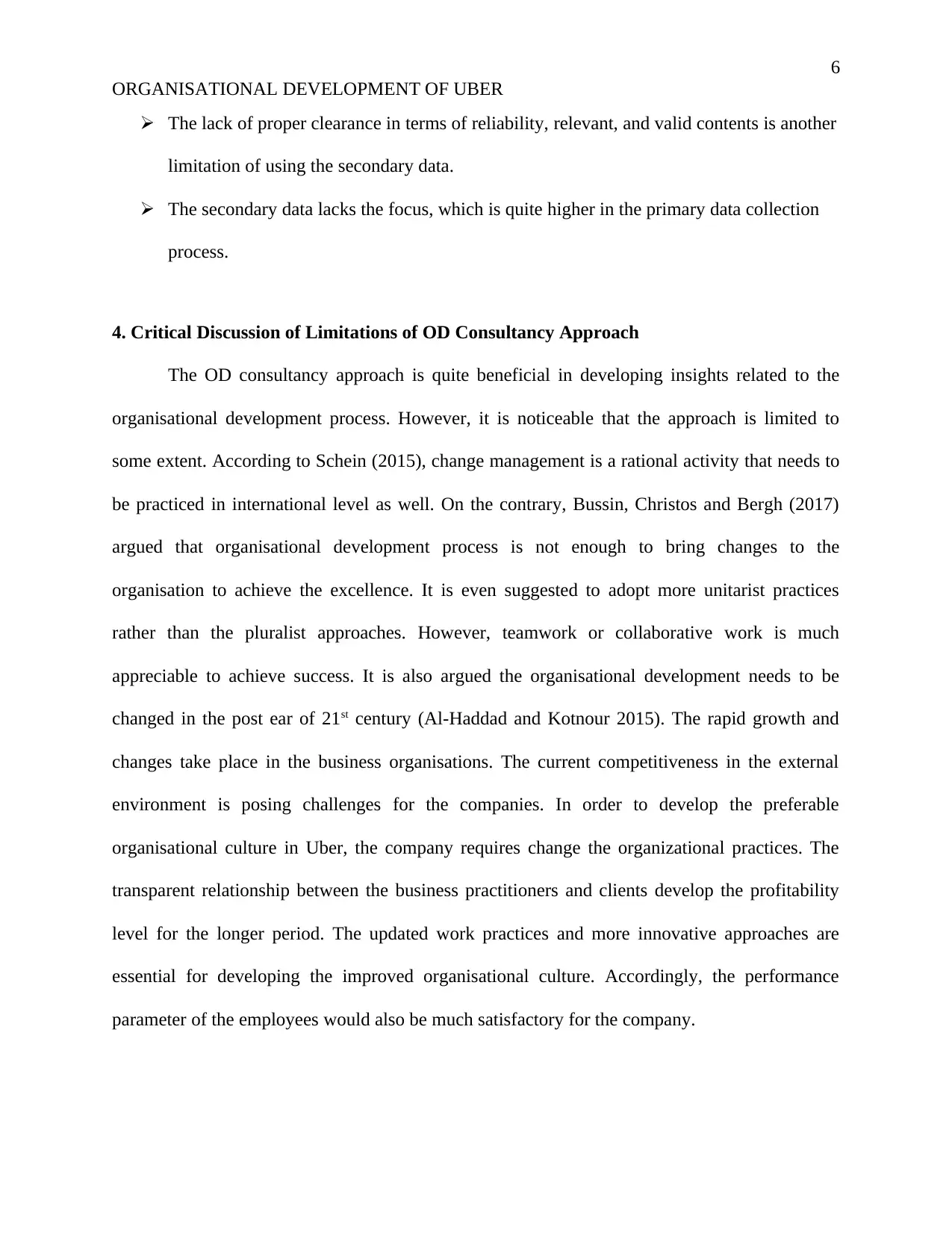
6
ORGANISATIONAL DEVELOPMENT OF UBER
The lack of proper clearance in terms of reliability, relevant, and valid contents is another
limitation of using the secondary data.
The secondary data lacks the focus, which is quite higher in the primary data collection
process.
4. Critical Discussion of Limitations of OD Consultancy Approach
The OD consultancy approach is quite beneficial in developing insights related to the
organisational development process. However, it is noticeable that the approach is limited to
some extent. According to Schein (2015), change management is a rational activity that needs to
be practiced in international level as well. On the contrary, Bussin, Christos and Bergh (2017)
argued that organisational development process is not enough to bring changes to the
organisation to achieve the excellence. It is even suggested to adopt more unitarist practices
rather than the pluralist approaches. However, teamwork or collaborative work is much
appreciable to achieve success. It is also argued the organisational development needs to be
changed in the post ear of 21st century (Al-Haddad and Kotnour 2015). The rapid growth and
changes take place in the business organisations. The current competitiveness in the external
environment is posing challenges for the companies. In order to develop the preferable
organisational culture in Uber, the company requires change the organizational practices. The
transparent relationship between the business practitioners and clients develop the profitability
level for the longer period. The updated work practices and more innovative approaches are
essential for developing the improved organisational culture. Accordingly, the performance
parameter of the employees would also be much satisfactory for the company.
ORGANISATIONAL DEVELOPMENT OF UBER
The lack of proper clearance in terms of reliability, relevant, and valid contents is another
limitation of using the secondary data.
The secondary data lacks the focus, which is quite higher in the primary data collection
process.
4. Critical Discussion of Limitations of OD Consultancy Approach
The OD consultancy approach is quite beneficial in developing insights related to the
organisational development process. However, it is noticeable that the approach is limited to
some extent. According to Schein (2015), change management is a rational activity that needs to
be practiced in international level as well. On the contrary, Bussin, Christos and Bergh (2017)
argued that organisational development process is not enough to bring changes to the
organisation to achieve the excellence. It is even suggested to adopt more unitarist practices
rather than the pluralist approaches. However, teamwork or collaborative work is much
appreciable to achieve success. It is also argued the organisational development needs to be
changed in the post ear of 21st century (Al-Haddad and Kotnour 2015). The rapid growth and
changes take place in the business organisations. The current competitiveness in the external
environment is posing challenges for the companies. In order to develop the preferable
organisational culture in Uber, the company requires change the organizational practices. The
transparent relationship between the business practitioners and clients develop the profitability
level for the longer period. The updated work practices and more innovative approaches are
essential for developing the improved organisational culture. Accordingly, the performance
parameter of the employees would also be much satisfactory for the company.
Paraphrase This Document
Need a fresh take? Get an instant paraphrase of this document with our AI Paraphraser
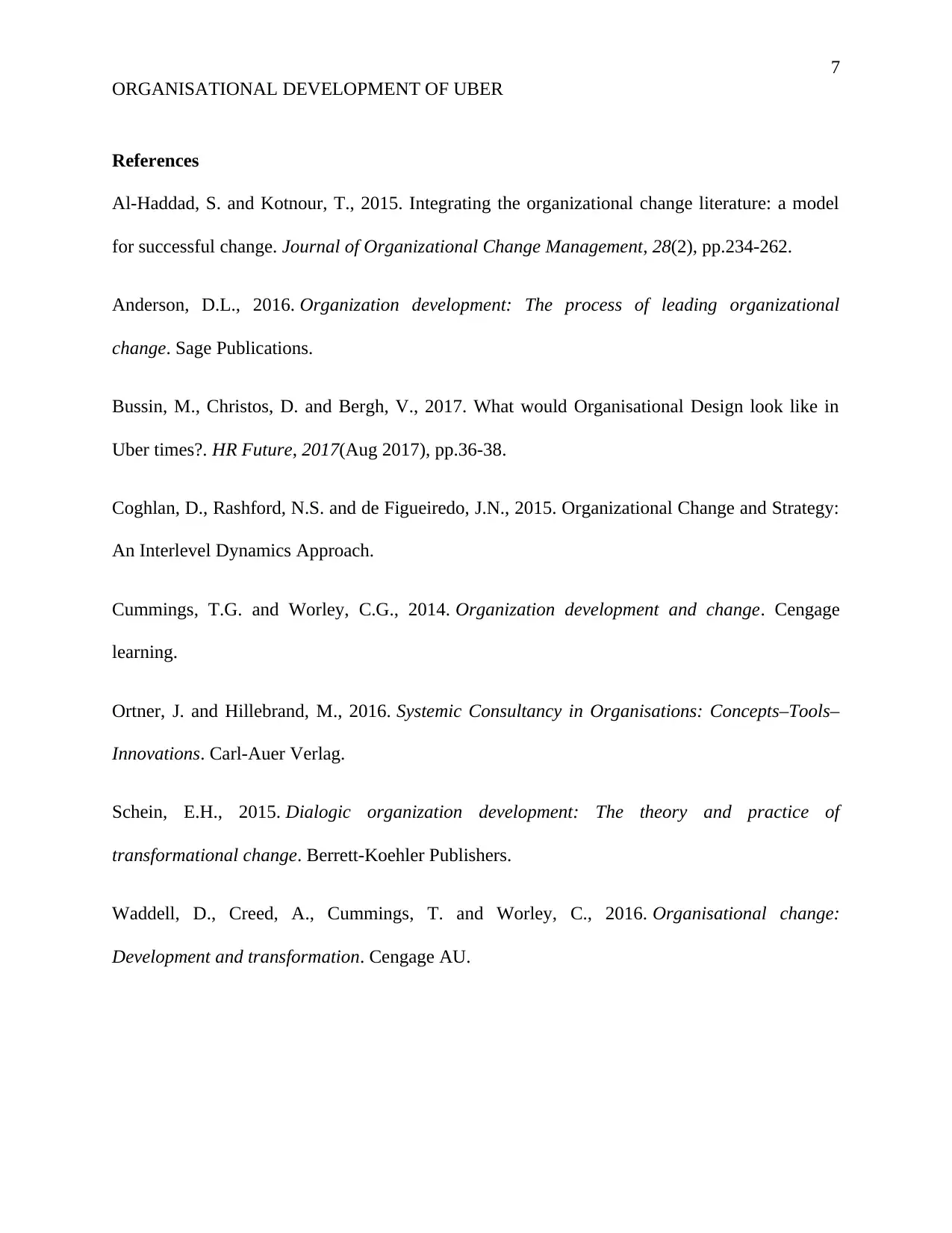
7
ORGANISATIONAL DEVELOPMENT OF UBER
References
Al-Haddad, S. and Kotnour, T., 2015. Integrating the organizational change literature: a model
for successful change. Journal of Organizational Change Management, 28(2), pp.234-262.
Anderson, D.L., 2016. Organization development: The process of leading organizational
change. Sage Publications.
Bussin, M., Christos, D. and Bergh, V., 2017. What would Organisational Design look like in
Uber times?. HR Future, 2017(Aug 2017), pp.36-38.
Coghlan, D., Rashford, N.S. and de Figueiredo, J.N., 2015. Organizational Change and Strategy:
An Interlevel Dynamics Approach.
Cummings, T.G. and Worley, C.G., 2014. Organization development and change. Cengage
learning.
Ortner, J. and Hillebrand, M., 2016. Systemic Consultancy in Organisations: Concepts–Tools–
Innovations. Carl-Auer Verlag.
Schein, E.H., 2015. Dialogic organization development: The theory and practice of
transformational change. Berrett-Koehler Publishers.
Waddell, D., Creed, A., Cummings, T. and Worley, C., 2016. Organisational change:
Development and transformation. Cengage AU.
ORGANISATIONAL DEVELOPMENT OF UBER
References
Al-Haddad, S. and Kotnour, T., 2015. Integrating the organizational change literature: a model
for successful change. Journal of Organizational Change Management, 28(2), pp.234-262.
Anderson, D.L., 2016. Organization development: The process of leading organizational
change. Sage Publications.
Bussin, M., Christos, D. and Bergh, V., 2017. What would Organisational Design look like in
Uber times?. HR Future, 2017(Aug 2017), pp.36-38.
Coghlan, D., Rashford, N.S. and de Figueiredo, J.N., 2015. Organizational Change and Strategy:
An Interlevel Dynamics Approach.
Cummings, T.G. and Worley, C.G., 2014. Organization development and change. Cengage
learning.
Ortner, J. and Hillebrand, M., 2016. Systemic Consultancy in Organisations: Concepts–Tools–
Innovations. Carl-Auer Verlag.
Schein, E.H., 2015. Dialogic organization development: The theory and practice of
transformational change. Berrett-Koehler Publishers.
Waddell, D., Creed, A., Cummings, T. and Worley, C., 2016. Organisational change:
Development and transformation. Cengage AU.
1 out of 8
Related Documents
Your All-in-One AI-Powered Toolkit for Academic Success.
+13062052269
info@desklib.com
Available 24*7 on WhatsApp / Email
![[object Object]](/_next/static/media/star-bottom.7253800d.svg)
Unlock your academic potential
Copyright © 2020–2026 A2Z Services. All Rights Reserved. Developed and managed by ZUCOL.





